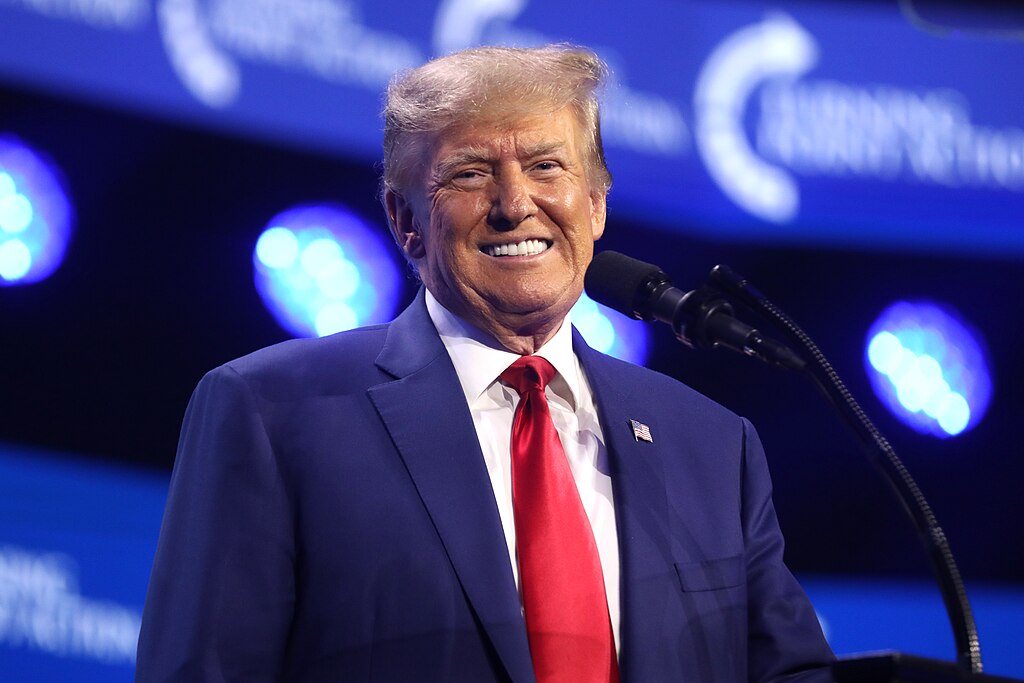Former President Donald Trump has stirred controversy with his recent remarks suggesting that U.S. presidents should have more influence over the Federal Reserve, particularly in setting interest rates. Trump’s assertion that his instincts surpass those of the Federal Reserve Board and its chairman has ignited a fierce debate among economists and political commentators, who warn that such a move could undermine the central bank’s independence and destabilize the economy.
Trump, who has long been critical of the Federal Reserve, argues that the central bank has made misguided decisions, particularly regarding interest rates. His comments reflect a broader frustration he has expressed throughout his political career, where he frequently criticized the Fed’s monetary policy for hindering economic growth. Trump’s belief that presidential input could lead to better decision-making at the Fed is rooted in his confidence in his economic instincts, which he claims are superior to those of current and former Fed officials.
The former president’s stance has alarmed many observers who view the Federal Reserve’s independence as a cornerstone of U.S. economic stability. The Fed, responsible for setting monetary policy and regulating the financial system, operates independently of political influence to ensure that decisions are made based on economic data and long-term goals rather than short-term political considerations.
Critics of Trump’s proposal argue that allowing presidents to influence Fed decisions directly could lead to politically motivated policies that prioritize immediate economic boosts over sustainable growth. They warn that this could result in inflation, market volatility, and a loss of confidence in the U.S. dollar. They contend that the potential erosion of the Fed’s independence could have far-reaching consequences for both domestic and global economies.
Supporters of the Fed’s autonomy point out that the central bank’s ability to act independently has been crucial in managing economic crises, such as the 2008 financial meltdown and the economic fallout from the COVID-19 pandemic. They argue that the Fed’s decision-making process, which involves careful analysis and consideration of various economic indicators, is essential for maintaining financial stability and fostering long-term growth.
The debate over Trump’s comments highlights a broader tension between political leadership and economic governance. While presidents are elected to guide the nation’s overall direction, the Fed manages the economy through impartial and technically informed decisions. This separation is intended to prevent short-term political pressures from dictating monetary policy, which could lead to economically damaging outcomes.
As Trump continues to position himself as a potential candidate for the 2024 presidential election, his views on the Federal Reserve will likely remain a focal point of discussion. His call for greater presidential control over monetary policy decisions raises essential questions about the balance of power between the executive branch and independent institutions.
The discussion surrounding Trump’s remarks reflects the broader challenges facing modern democracies, where the need for expert-driven policy is often at odds with populist demands for more direct control over key institutions. As the 2024 election approaches, the future of the Federal Reserve’s independence may become a critical issue for voters and policymakers alike.



 Pentagon Ends Military Education Programs With Harvard University
Pentagon Ends Military Education Programs With Harvard University  India–U.S. Interim Trade Pact Cuts Auto Tariffs but Leaves Tesla Out
India–U.S. Interim Trade Pact Cuts Auto Tariffs but Leaves Tesla Out  New York Legalizes Medical Aid in Dying for Terminally Ill Patients
New York Legalizes Medical Aid in Dying for Terminally Ill Patients  Trump Allows Commercial Fishing in Protected New England Waters
Trump Allows Commercial Fishing in Protected New England Waters  Japan Election 2026: Sanae Takaichi Poised for Landslide Win Despite Record Snowfall
Japan Election 2026: Sanae Takaichi Poised for Landslide Win Despite Record Snowfall  South Korea Assures U.S. on Trade Deal Commitments Amid Tariff Concerns
South Korea Assures U.S. on Trade Deal Commitments Amid Tariff Concerns  Nighttime Shelling Causes Serious Damage in Russia’s Belgorod Region Near Ukraine Border
Nighttime Shelling Causes Serious Damage in Russia’s Belgorod Region Near Ukraine Border  TrumpRx Website Launches to Offer Discounted Prescription Drugs for Cash-Paying Americans
TrumpRx Website Launches to Offer Discounted Prescription Drugs for Cash-Paying Americans  Jack Lang Resigns as Head of Arab World Institute Amid Epstein Controversy
Jack Lang Resigns as Head of Arab World Institute Amid Epstein Controversy  Netanyahu to Meet Trump in Washington as Iran Nuclear Talks Intensify
Netanyahu to Meet Trump in Washington as Iran Nuclear Talks Intensify  Trump Endorses Japan’s Sanae Takaichi Ahead of Crucial Election Amid Market and China Tensions
Trump Endorses Japan’s Sanae Takaichi Ahead of Crucial Election Amid Market and China Tensions  U.S. Announces Additional $6 Million in Humanitarian Aid to Cuba Amid Oil Sanctions and Fuel Shortages
U.S. Announces Additional $6 Million in Humanitarian Aid to Cuba Amid Oil Sanctions and Fuel Shortages  Trump Backs Nexstar–Tegna Merger Amid Shifting U.S. Media Landscape
Trump Backs Nexstar–Tegna Merger Amid Shifting U.S. Media Landscape  Missouri Judge Dismisses Lawsuit Challenging Starbucks’ Diversity and Inclusion Policies
Missouri Judge Dismisses Lawsuit Challenging Starbucks’ Diversity and Inclusion Policies  U.S.-India Trade Framework Signals Major Shift in Tariffs, Energy, and Supply Chains
U.S.-India Trade Framework Signals Major Shift in Tariffs, Energy, and Supply Chains  Trump’s Inflation Claims Clash With Voters’ Cost-of-Living Reality
Trump’s Inflation Claims Clash With Voters’ Cost-of-Living Reality  Trump Says “Very Good Talks” Underway on Russia-Ukraine War as Peace Efforts Continue
Trump Says “Very Good Talks” Underway on Russia-Ukraine War as Peace Efforts Continue 































